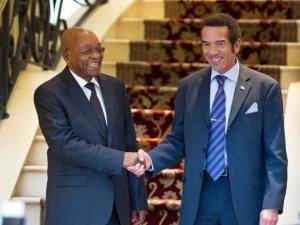

Johannesburg – After taking a pounding from African governments over xenophobic attacks in South Africa, President Zuma was delighted when Botswana President Ian Khama came to his defence at this week’s regional summit in Harare.
Khama was apparently the unnamed leader quoted saying at the Southern African Development Community (SADC) summit on industrialisation that “South Africa can’t be looked at as the employment bureau for the region”.
South African officials said Khama’s statement, in front of all other SADC countries, was “fantastic” because it endorsed Zuma’s controversial criticism of African leaders in his Freedom Day speech, for creating adverse conditions that drove people to South Africa to seek a better life.
Though officials would not identify which leader made the remarks, they said he was leader of a country which had managed its economy well, so that few citizens had fled to South Africa. It also faced similar challenges to South Africa, especially an influx of illegal immigrants from some of the same countries. This could only refer to Khama.
Large numbers of Zimbabweans have flowed into Botswana since the political crisis began soon after 2000, one of the reasons why Khama has been an outspoken critic in SADC of Zimbabwe for mismanaging his country.
This week Zimbabwe’s controversial Information Minister Jonathan Moyo suggested that Zuma was justifying xenophobia by partly blaming African countries for attacks.
Pretoria declined to respond publicly to Moyo’s criticism.
Meanwhile, Mozambique announced that it would boycott a tourism fair in Durban this month because of attacks on its people. And a Malawian news website quoted its information minister, Kondwani Nankhumwa, saying it was discussing joint measures with other SADC and African Union countries against South Africa.
- Chamisa under fire over US$120K donation
- Mavhunga puts DeMbare into Chibuku quarterfinals
- Pension funds bet on Cabora Bassa oilfields
- Councils defy govt fire tender directive
Keep Reading
After these sharp exchanges, some expected xenophobia to overshadow other issues at the summit, but it evidently didn’t, though it certainly did come up.
The communiqué after the summit said Zuma had briefed fellow leaders on attacks on foreign nationals, including some from SADC states. “While condemning the attacks, (the) summit commended the measures that the government of South Africa has put in place, and resolved to work together to deal with the situation and ensure it does not recur.”
South African officials said Zuma told leaders that South Africa would tighten immigration laws, and deploy troops to all borders to curb an influx of illegal immigrants.
Officials said leaders also discussed what they should do to strengthen their economies to encourage people to stay home.
However, Mugabe told journalists at the summit that Zimbabweans were “not pushed by their governments”.
“They go voluntarily . . . They think South Africa is heaven . . . ”
South African officials said xenophobia discussions had partly merged with the official agenda, which was to advance SADC’s industrialisation and economic growth strategy.
Leaders approved the SADC’s Regional Strategy and Roadmap for Industrialisation, and intend to draft an action plan.
Other South African officials said if industrialisation strategy succeeded, it would boost SADC economies, create jobs, and curb the mass exodus of other nationals to South Africa to seek jobs and social services.
Mugabe formally handed over to the SADC the Regional Peacekeeping Training Centre, a facility established in Zimbabwe to harmonise peacekeeping training in the SADC region.
-IOL










